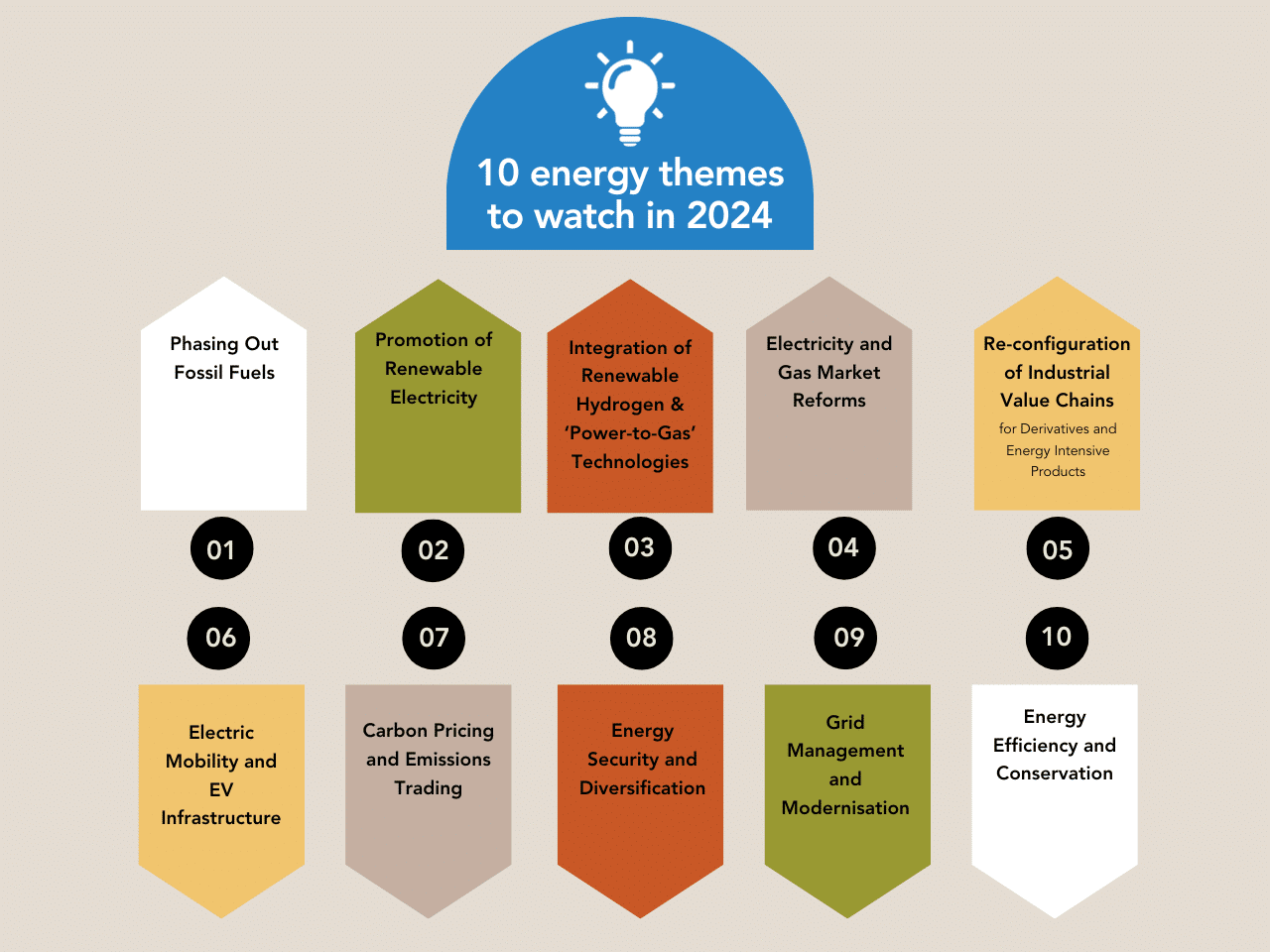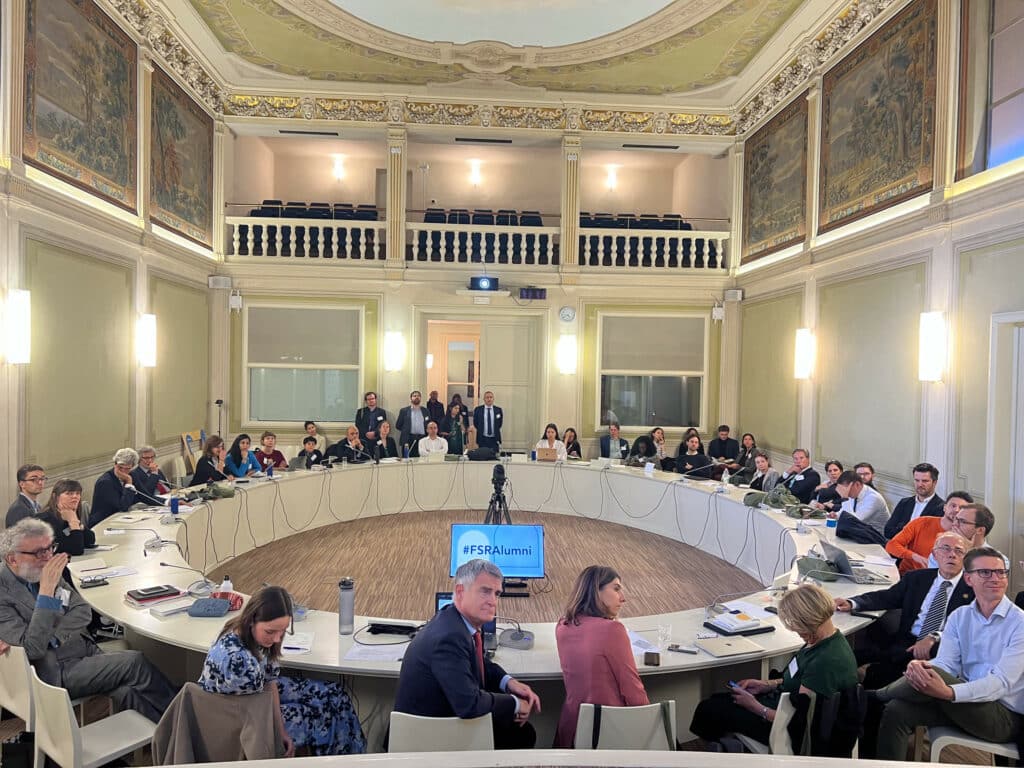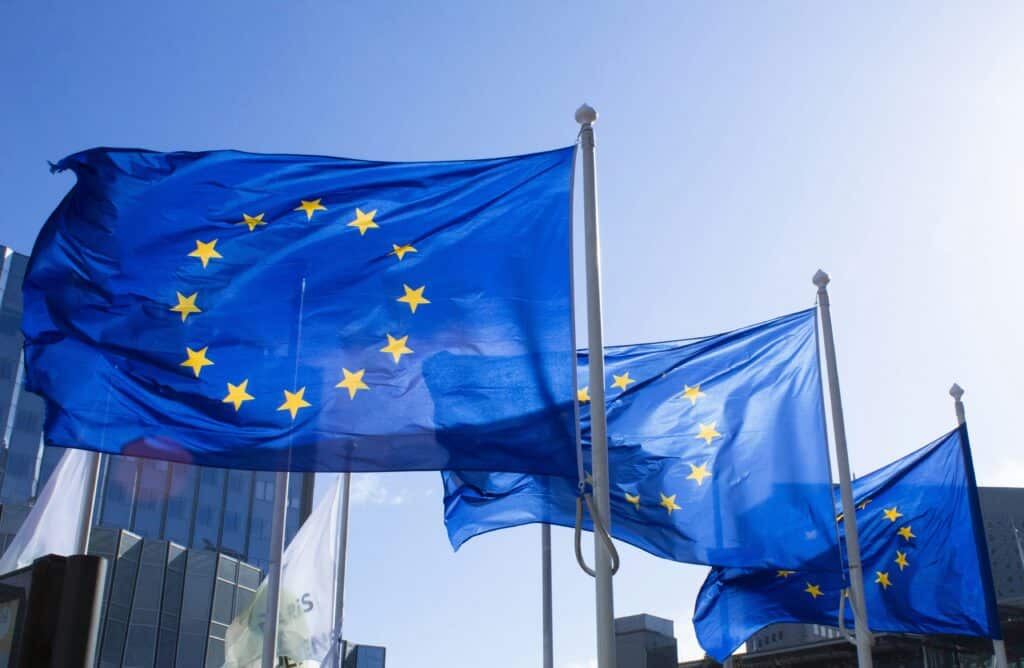10 themes to watch in 2024
This is the second installment of the Topic of the Month 'Back to school: exploring FSR training"
Some of the most important legislative files in European energy and climate policy will be finalised and adopted in 2024. Below we present a shortlist of key themes practitioners should target to remain at the forefront of the sector going into this transformative period.
10 themes to watch in 2024
The field of European energy and climate policy is evolving quickly as the region grapples with the simultaneous challenges of energy security, high and unstable spot market prices, and deep decarbonisation of the economy. At the same time, energy commodities are increasingly interlinked and can no longer be studied in silos, whilst the intersection of energy policy with other areas such as climate, industry, and agriculture have never been closer.
In the second instalment of our Topic of the Month "Back to School: Exploring FSR Training", we outline some key themes we have identified for energy and climate policy going into 2024 and map how the course portfolio of the FSR is adapting to try and cover them.
1. Phasing Out Fossil Fuels
The transition from fossil fuels to cleaner energy sources remains one of the central cross-sector policy goals in Europe. Policy professionals must be well-versed in the strategies and legislation for phasing out coal and reducing greenhouse gas emissions in line with the European Green Deal and the NECP1s of specific Member States. Courses covering energy transition dynamics, carbon pricing mechanisms, and the development of alternative energy sources are essential to navigate this transition effectively. For a transition away from fossil fuels to be enduring and retain social buy-in, it must also be delivered in a ‘just’ way, avoiding a disproportionate burden on certain communities.
Our EU Green Deal course is our flagship training, covering in breadth and depth the reconfiguring of the European economy towards a Net-Zero future. This can be complemented by more sector specific, specialist courses, including on Regulation and Integration of Renewable Energy, and Regulatory Delivery.
2. Promotion of Renewable Electricity
One of the most prominent trends in European energy policy is the promotion of renewable electricity sources. Policy professionals need to have a deep understanding of the policies and regulations applying to wind, solar, and hydropower, as well as the various support mechanisms in place. The value chains and operating conditions of these technologies are very different to the fossil incumbents, and training must adapt accordingly. Our training courses in renewable energy policy and regulation help to understand the functioning of specific tools such as feed-in tariffs and power purchase agreements, as well as the wider implications of integrating variable renewables into the energy grid. Our most specific course on this subject is Regulation and Integration of Renewable Energy, but we also have a detailed course on Regulation of the Power Sector, and an extensive annual training course specifically on The Regulation of Energy Utilities.
3. Integration of Renewable Hydrogen and ‘Power-to-Gas’ Technologies
Renewable hydrogen is establishing an important role for itself as a clean energy carrier, with the EU’s Hydrogen Strategy and Hydrogen and Decarbonised Gas Market Package providing a roadmap for its development. Europe is in the process of constructing one of the most comprehensive and complex regulatory ecosystems for renewable hydrogen and its derivatives, our Clean Molecules for the Energy Transition training is overhauled every year to keep it at the cutting edge of regulatory and technical developments.
4. Electricity and Gas Market Reforms
Electricity and (natural) gas together represent the large majority of final energy products consumed in Europe, and the regulation of these vectors continues to represent foundational knowledge for any energy policy professional. In the wake of an 18-month energy crisis, the European Commission tabled a proposal earlier this year to reform the EU’s electricity market design. With a general approach now agreed by the Council, new rules are not far away.
The fundamentals of electricity and gas markets have always been at the core of the FSR’s training portfolio. We attempt to cover market rules, network codes, market trends, and the evolving landscape of energy markets in line with the corresponding EU directives and regulations. This knowledge is essential for shaping effective policies that ensure fair competition, reliability, and affordability in these sectors. See…
- Specialised Training on the Regulation of Gas Markets
- EU Gas Network Codes
- Evolution of Electricity Markets in Europe
- Regulation of the Power Sector
- Summer School Regulation of Energy Utilities
- Executive Course to Master Electricity Markets
- Annual Training on the Regulation of Energy Utilities
- REMIT and its Implementation
5. Re-configuration of Industrial Value Chains for Derivatives and Energy Intensive Products
As Europe works towards resolving its energy ‘trilemma’ of aligning price, security, and sustainability aims – energy intensive industries are one of the key areas of focus. The energy crisis triggered a sharp decline in output from several energy intensive sectors in Europe, including cement and aluminium. Although production has rebounded to some extent, largely thanks to generous state aid subsidies, these economic conditions are uneconomical long-term, and it could signal a structural shift in Europe’s industrial landscape moving forward.
Recent strategic documents such as the Net Zero Industry Act and Green Deal Industrial Plan indicate a potential repositioning of European industrial aims towards ‘clean-tech’ or ‘net-zero aligned’ sectors, for example decarbonised steel production, electrolyser manufacturing, battery technology, etc. A deep transformation of the economy towards these sectors would have meaningful implications for the energy sector and the configuration of physical energy flows, as well as flows of finance and trade, both within the bloc and with third countries. The cross-sectoral and cross-vector nature of this subject makes it an essential foundational knowledge for any practitioner engaged in the energy and climate public policy space.
Trainings at the FSR are adapting to take account of this new landscape, for example through the EU Green Deal course, but also the School on Economics and Policy of Trade and Climate Change, Clean Molecules for the Energy Transition, and the Executive Course to Master Electricity Markets.

6. Electric Mobility and EV Infrastructure
The promotion of electric vehicles (EVs) and the development of charging infrastructure are at the intersection of European energy, climate, and transport policy. Training courses such as Electric Vehicles – Mobility Meets the Power System provide insights into the latest technologies, incentives for EV adoption, and strategies for expanding charging networks, in line with the EU Mobility Strategy.
7. Carbon Pricing and Emissions Trading
The European Union’s Emissions Trading System has been perhaps the strongest single lever for reducing greenhouse gas emissions from industry, and it is now in the process of expanding to cover a much wider range of sectors. To understand how this expansion of the ETS will come to effect consumers and the wider decarbonisation of the economy, practitioners should undergo training in carbon pricing, emissions trading, and climate policy instruments, covering both compliance and voluntary carbon markets.
The Climate Area hosts several trainings covering these subjects and much more besides, including the School on Economics and Policy of Trade and Climate Change, as well as contributing dedicated sections of the EU Green Deal course. The Executive Course to Master Electricity Markets explores the intersection of emissions pricing with electricity markets specifically, including reforms and extensions of the EU ETS.
8. Energy Security and Diversification
The diversification of fossil energy sources and reconfiguring of trade partnerships has been perhaps the most acute short-term priority in European energy policy over the past 18-months. However, in the long-term Europe is targeting a greater share of domestically produced renewable energy, as a way of reducing external dependency in absolute terms. This tension between short-term diversification of conventional fuels and a long-term transition to clean, predominantly domestically produced energy, was outlined in REPowerEU earlier this year.
Practitioners should therefore understand the implications of global events on energy security and how to mitigate risks, but also the implications of scaling domestic renewable energy production and the consequences therein for their value chains. This includes regulation and support schemes, but also technology policy and scaling, as well as the geopolitics of critical raw materials.
These different aspects of energy security are touched upon in several courses, including for gas in Clean Molecules for the Energy Transition and Specialised Training on the Regulation of Gas Markets, as well as for electricity in the Evolution of Electricity Markets in Europe and EU Green Deal courses.
9. Grid Management and Modernisation
Grid modernisation is essential for accommodating the integration of large quantities of variable renewable electricity generation, with connection capacity constraints arguably representing the most pressing limitation to decarbonising the EU’s energy sector. Smart grids, digitalisation, and flexibility mechanisms can all help to alleviate these physical infrastructural limitations and must be central considerations in network planning. Training in grid modernisation and smart grid technologies should align with EU policies and initiatives, such as the Clean Energy for All Europeans Package. Our Evolution of Electricity Markets in Europe course covers these subjects in detail, whilst the Clean Molecules for the Energy Transition training looks at the relationship between electricity and gas infrastructure planning from a sector coupling/integration perspective.
10. Energy Efficiency and Conservation
Europe remains energy poor, and the cheapest, most secure, and most sustainable kWh of energy is the one not consumed. Efforts to improve energy efficiency across sectors are critical in meeting climate targets, as outlined in the European Energy Efficiency Directive. Policy professionals should be up to date with energy efficiency policies, including building codes, transportation initiatives, and industrial energy management, in accordance with EU directives and regulations.
Our EU Green Deal course covers the fundamentals of these issues from a buildings and energy management perspective, whilst Clean Molecules for the Energy Transition includes specific training on retention and loss of energy during conversion between vectors.
In conclusion, policy professionals in the European energy policy space face a complex and rapidly changing landscape. Navigating these challenges effectively requires continuous learning and development, covering more than just energy commodity markets. At FSR we are continuously trying to evolve our offerings to equip professionals with the tools and knowledge required to shape effective policies and contribute to a sustainable, low-carbon energy future for Europe.






